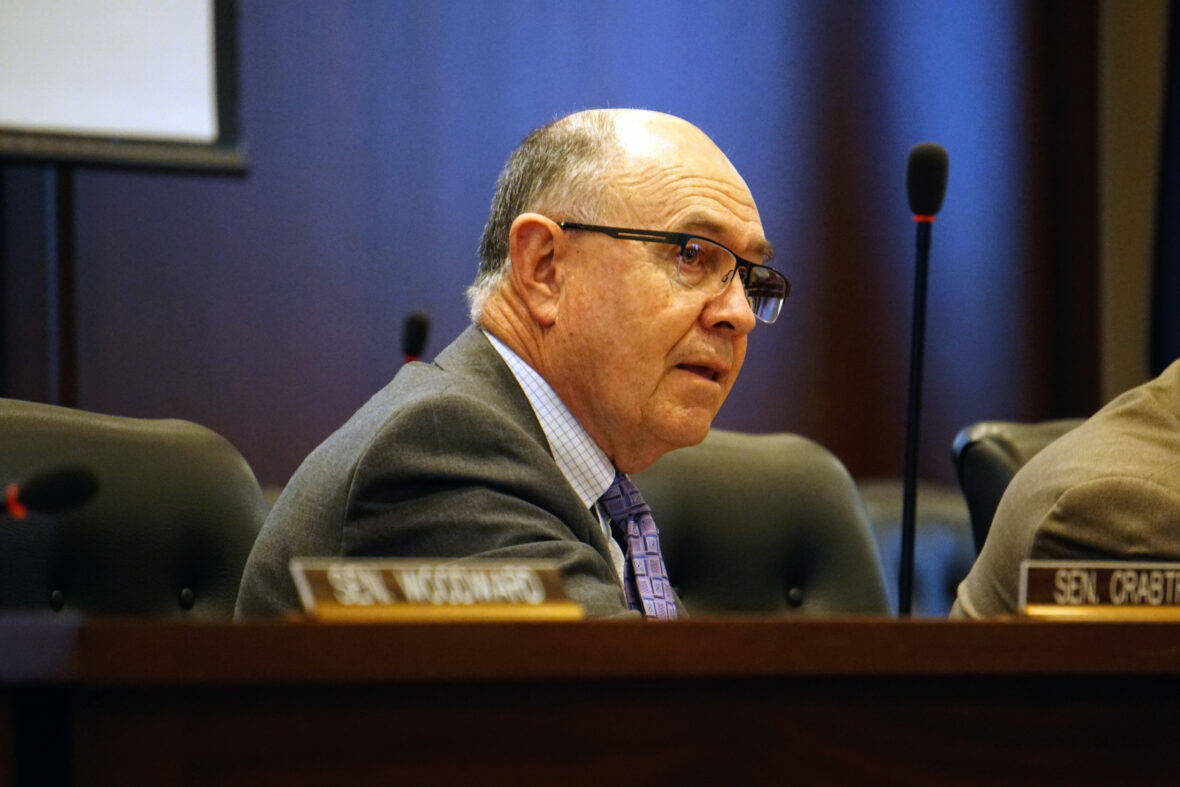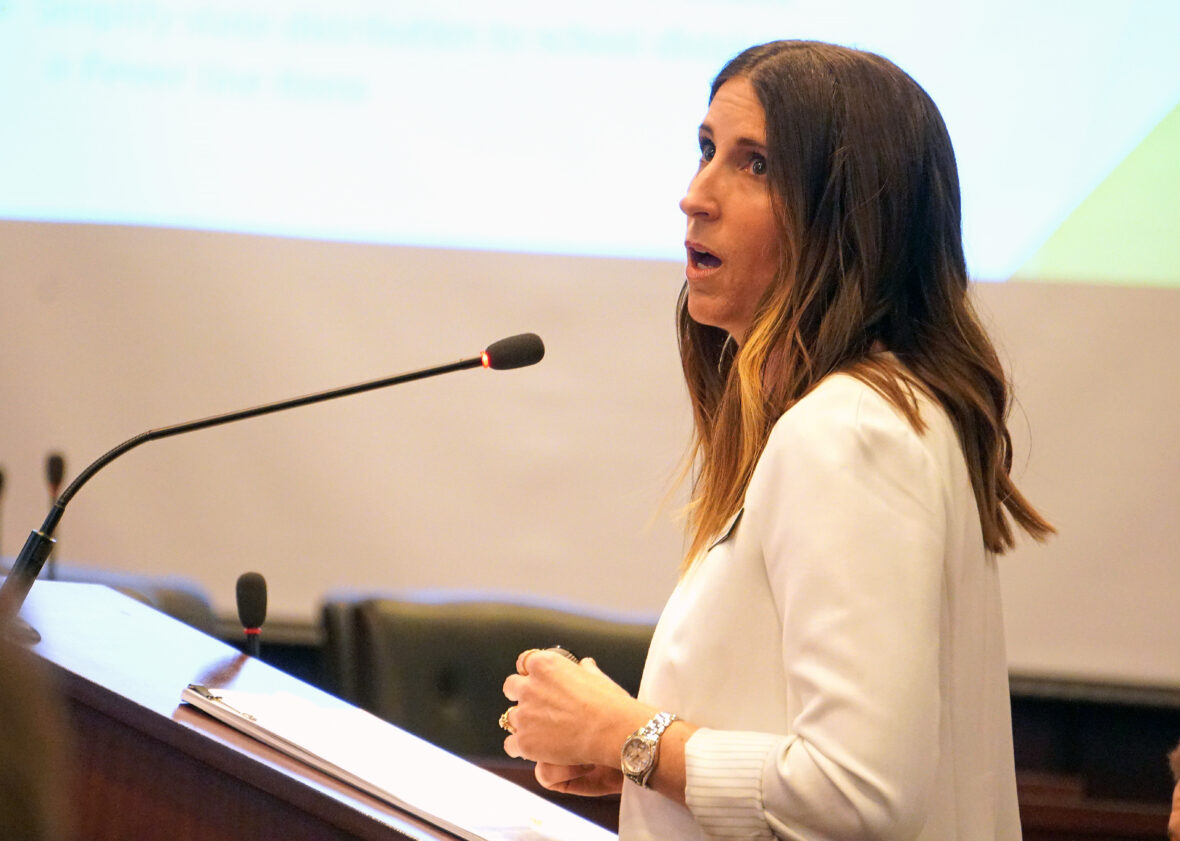After two hours of testimony — and repeated calls to slow down — one key senator says a school funding formula overhaul bill won’t pass this year.

“The reality of it is, this probably is going to continue to be worked on,” Senate Majority Leader Chuck Winder, R-Boise, said at the close of a Senate Education Committee hearing Monday afternoon.
Winder’s pronouncement surprised one of the bill’s co-authors.
“I’m rolling some stuff in my brain for a potential path forward,” said Sen. Lori Den Hartog, R-Meridian. “I think we still have some options.”
While the fate of the bill is unclear, one thing was in clear focus Monday afternoon. School leaders from large and small districts have a long list of questions and concerns about the funding formula overhaul — including some familiar issues.
‘It’s time to chart a new course’
Monday marked a milestone in an arduous process to rewrite the K-12 funding formula. For the first time this session, a legislative committee had a bill on its docket, and a public hearing on the bill’s merits.
The hearing was a long time coming. A legislative committee has spent the past three summers studying the funding formula, the complicated method the state uses to carve up more than $1.8 billion in state spending. Winder co-chaired that committee, and Den Hartog was a committee member.

Senate Education took no formal action Monday on the funding formula bill, Senate Bill 1196. At the outset of the meeting, committee Chairman Dean Mortimer said there would be no vote Monday. But in an opening presentation, Den Hartog spelled out her case for a change.
The state last rewrote its funding formula in 1994. Since then, lawmakers have shoehorned 63 line items into the formula, in a failed attempt to catch up with the needs of today’s students.
Adopting a new model — and distributing dollars based largely on enrollment — allows money to follow mobile students through a rapidly changing school system.
Citing generally flat scores on the Idaho Standards Acheivement Test, Den Hartog said the state needs to do a better job of meeting student needs.
“I would argue that it’s time to chart a new course,” she said.
‘Let’s do this right, not almost right’
But after Den Hartog argued for this new course, speaker after speaker urged senators to move slowly.
They heard this message from state superintendent Sherri Ybarra. “We’re still unsure how we would implement the new formula,” she said. “Simply put, we need more time.”
They heard it from the education “stakeholder” groups, and the Statehouse lobbyists who have been tracking the issue all session. “Let’s do this right, not almost right,” said Harold Ott, speaking on behalf of Idaho Rural Schools and the Idaho Association of School Administrators.
And at a hearing that was only announced on Friday, school administrators came from everywhere from Lakeland to Fremont County to urge caution and spell out their concerns.
Lakeland has invested heavily in veteran teachers, in hopes of keeping educators from taking higher paying jobs in nearby Washington state. But teacher experience isn’t a factor in the new funding formula proposal.
“This bill will punish us for these efforts,” assistant superintendent Lisa Sexton said.
Nezperce district Superintendent Shawn Tiegs called the bill “a punch in the gut” for his tiny district of 140 students. He said patrons will still need to vote for supplemental levies to cover 15 to 20 percent of the district’s budget.
Several speakers worried about the long term. The funding formula bill has a “hold positive” clause. Districts and charters will receive a 2 percent funding increase every year through 2022-23 — prompting concerns that some schools will face a big budget cut after the transition period.
Not every speaker came to the Statehouse to criticize the bill. Echoing Den Hartog, Blaine County district Superintendent GwenCarol Holmes called the new formula a much-needed paradigm shift — one that will provide extra funding for at-risk students, English language learners and special education students.
“This funding formula directs our conversation toward these students,” Holmes said.
‘I don’t see how it can happen’
Monday’s hearing capped a turbulent day in the funding formula debate — one that placed the spotlight squarely on Senate Education.
Republicans on the House Education Committee staged an unusual walkout Monday morning, refusing to attend the committee’s meeting. Without a quorum in place, the committee could not consider or vote on a variation of a funding formula bill — pushed by committee Chairman Lance Clow, R-Twin Falls.
Consequently, the funding formula discussion has begun in Senate Education. And might end there.
It’s unclear when, or whether, the committee will vote on the bill. It isn’t listed on the committee’s Tuesday afternoon agenda.
Den Hartog would like to pass a funding formula bill, in some form.
But while the Legislature has some non-negotiable items on its to-do list — particularly Medicaid expansion — a funding formula bill isn’t on that list. The bill needs and deserves more work, Winder said, and time is running out.
“I don’t see how it can happen,” he said.
